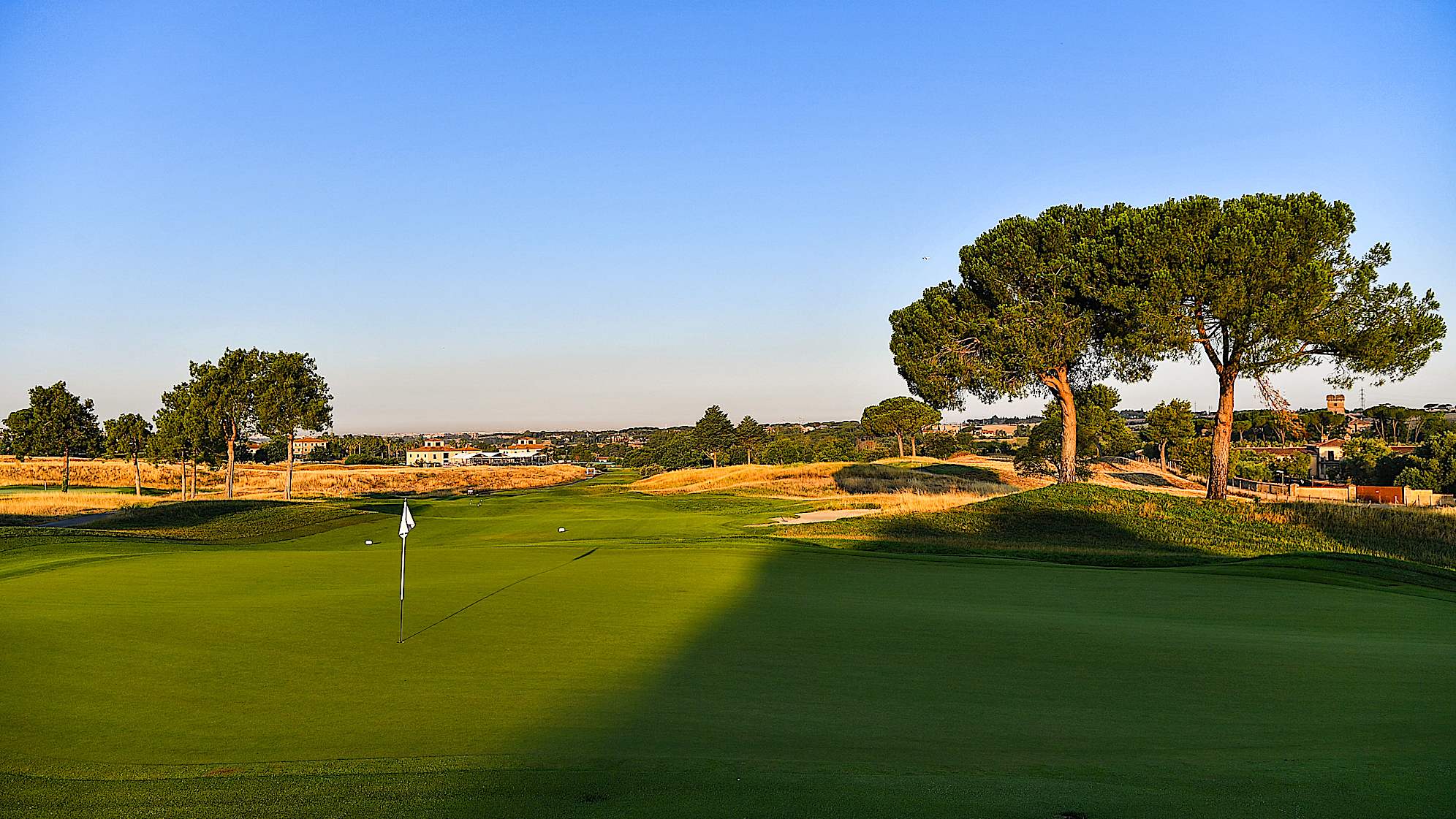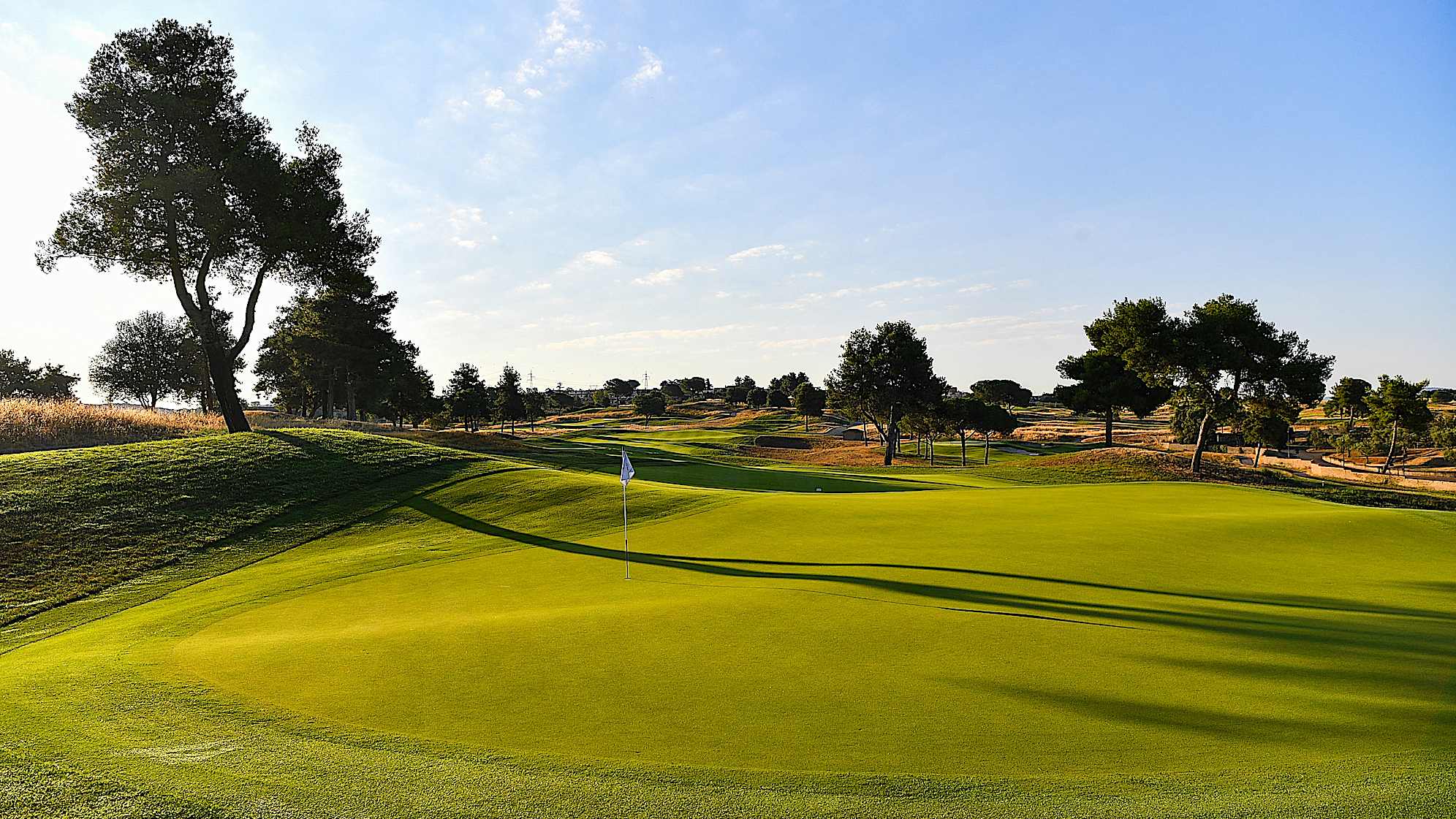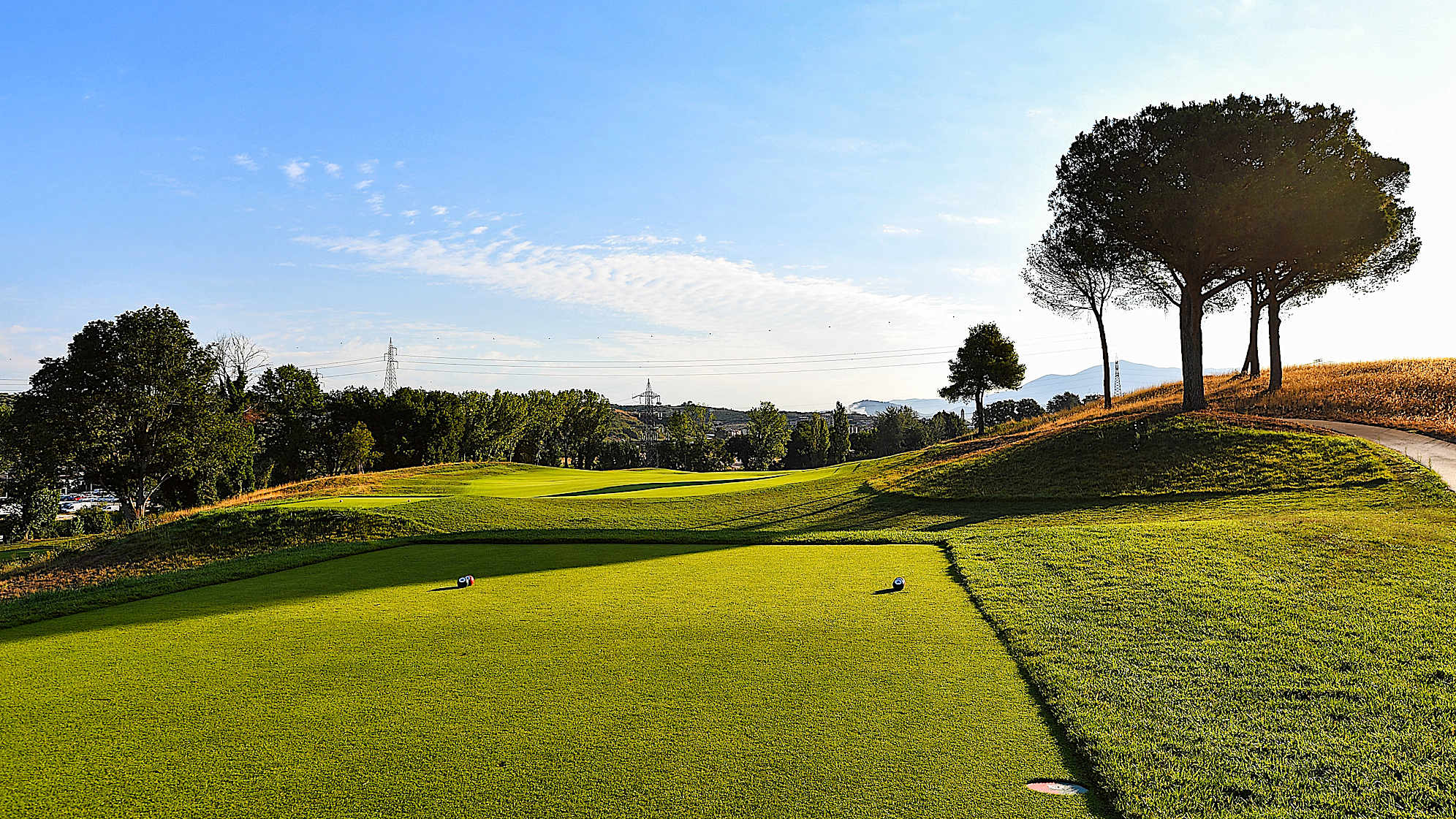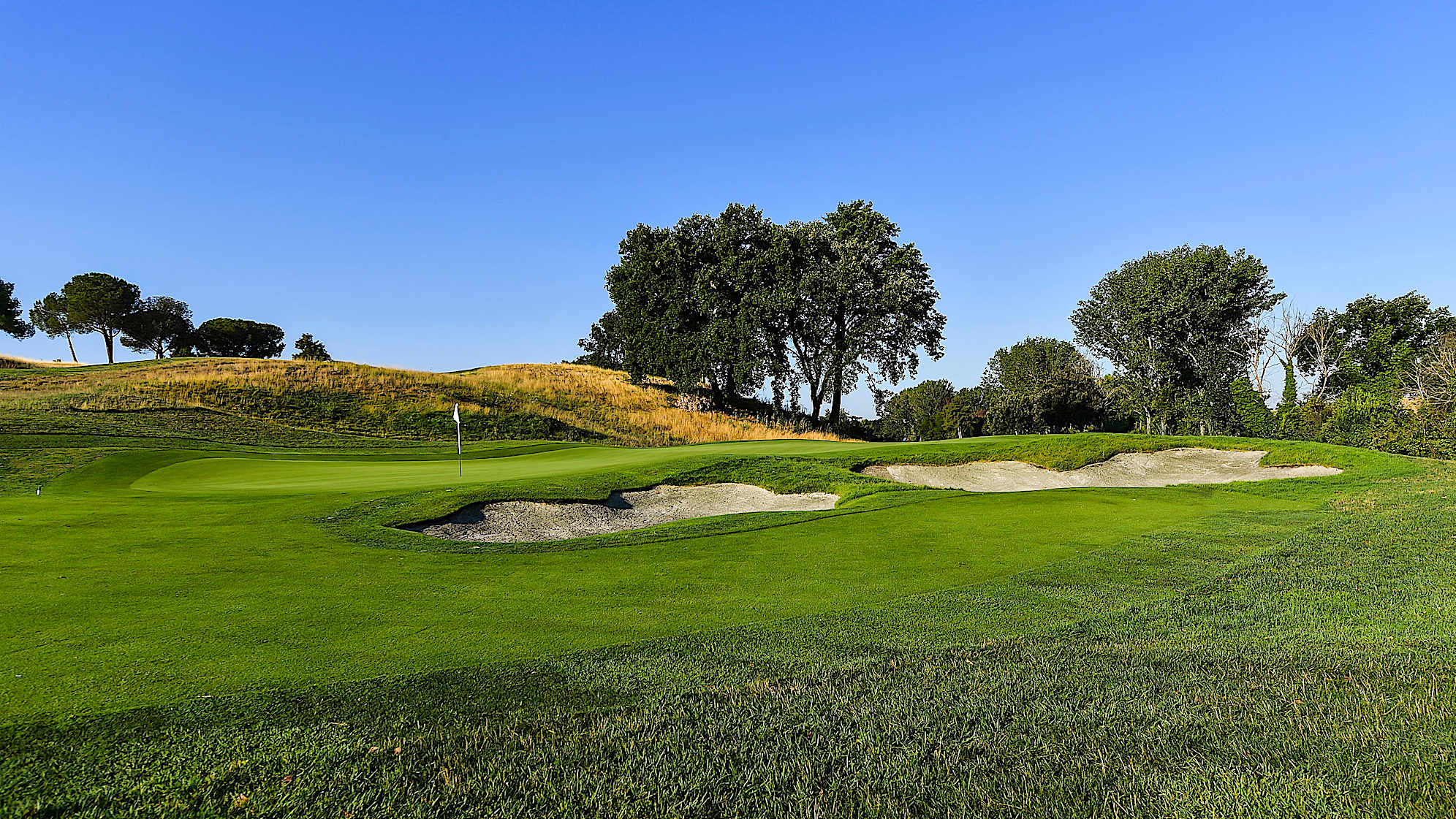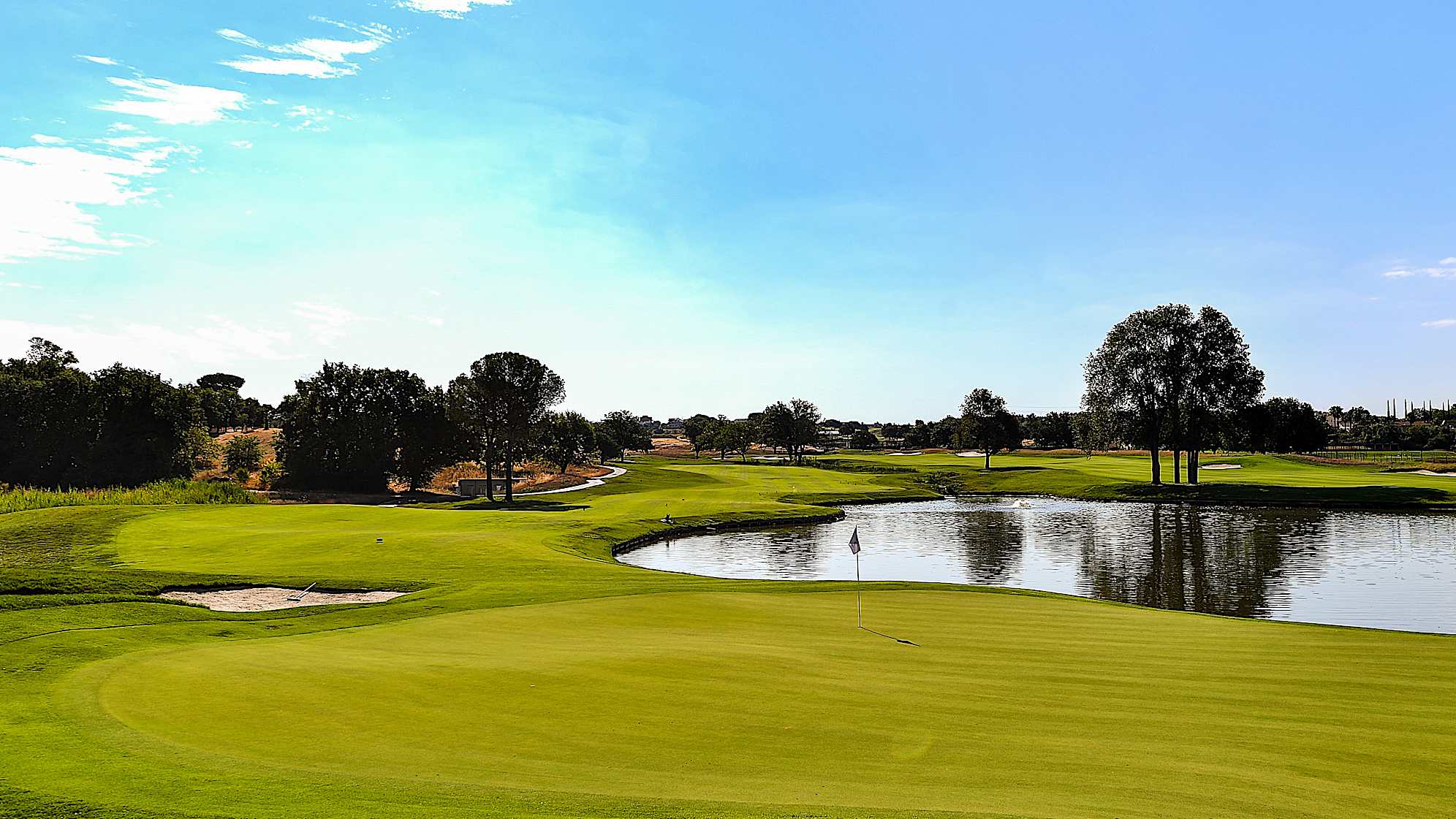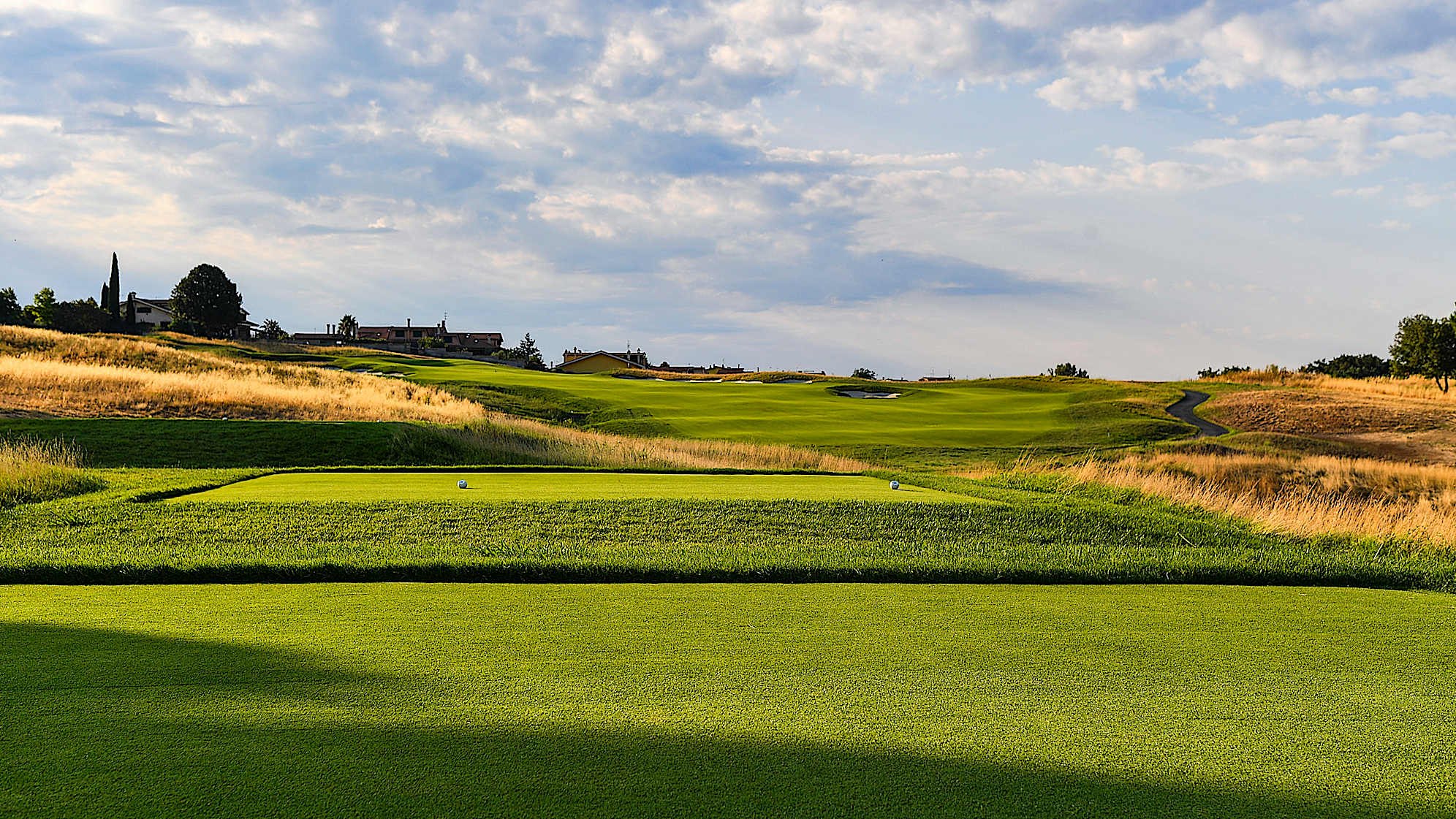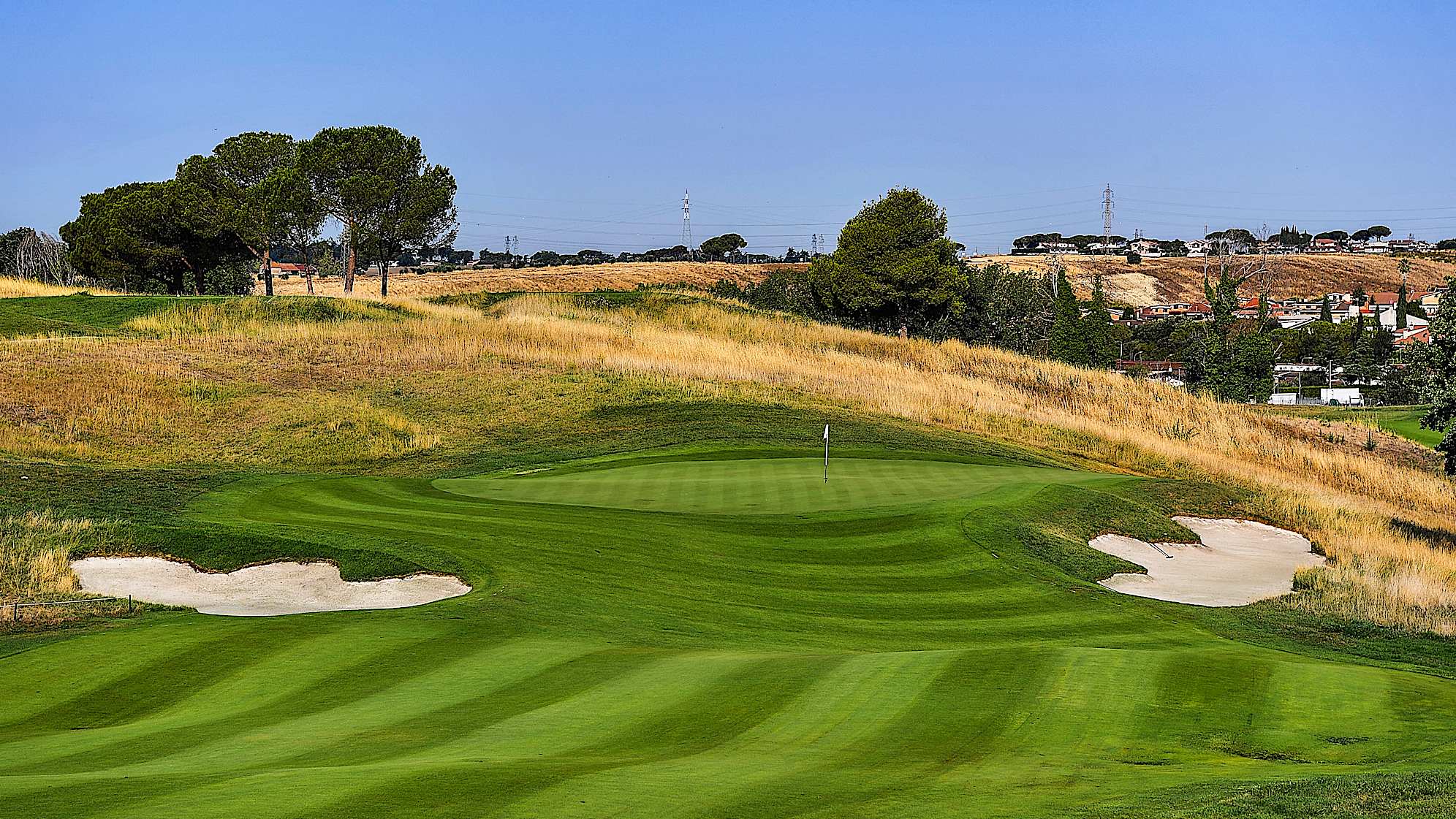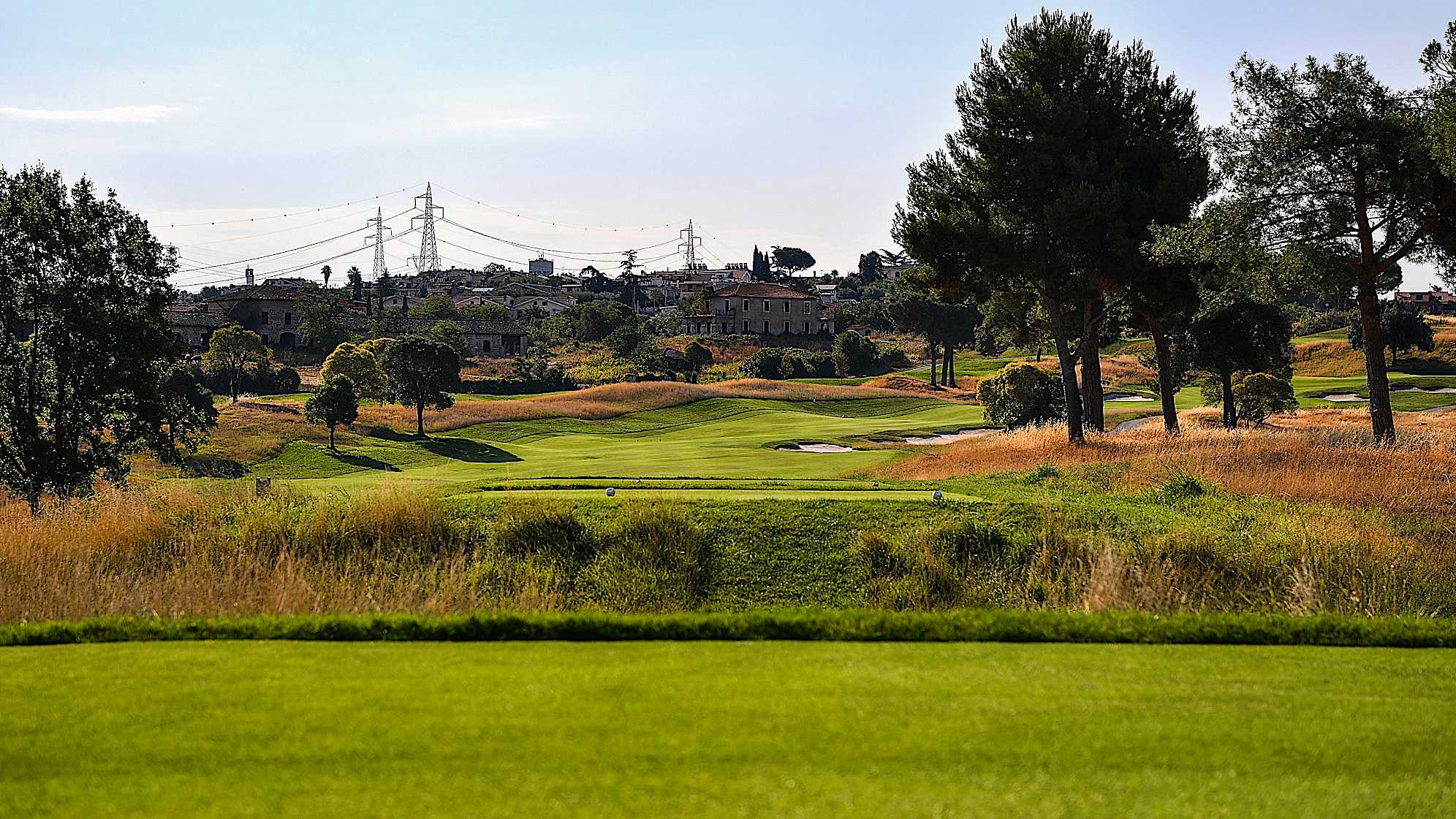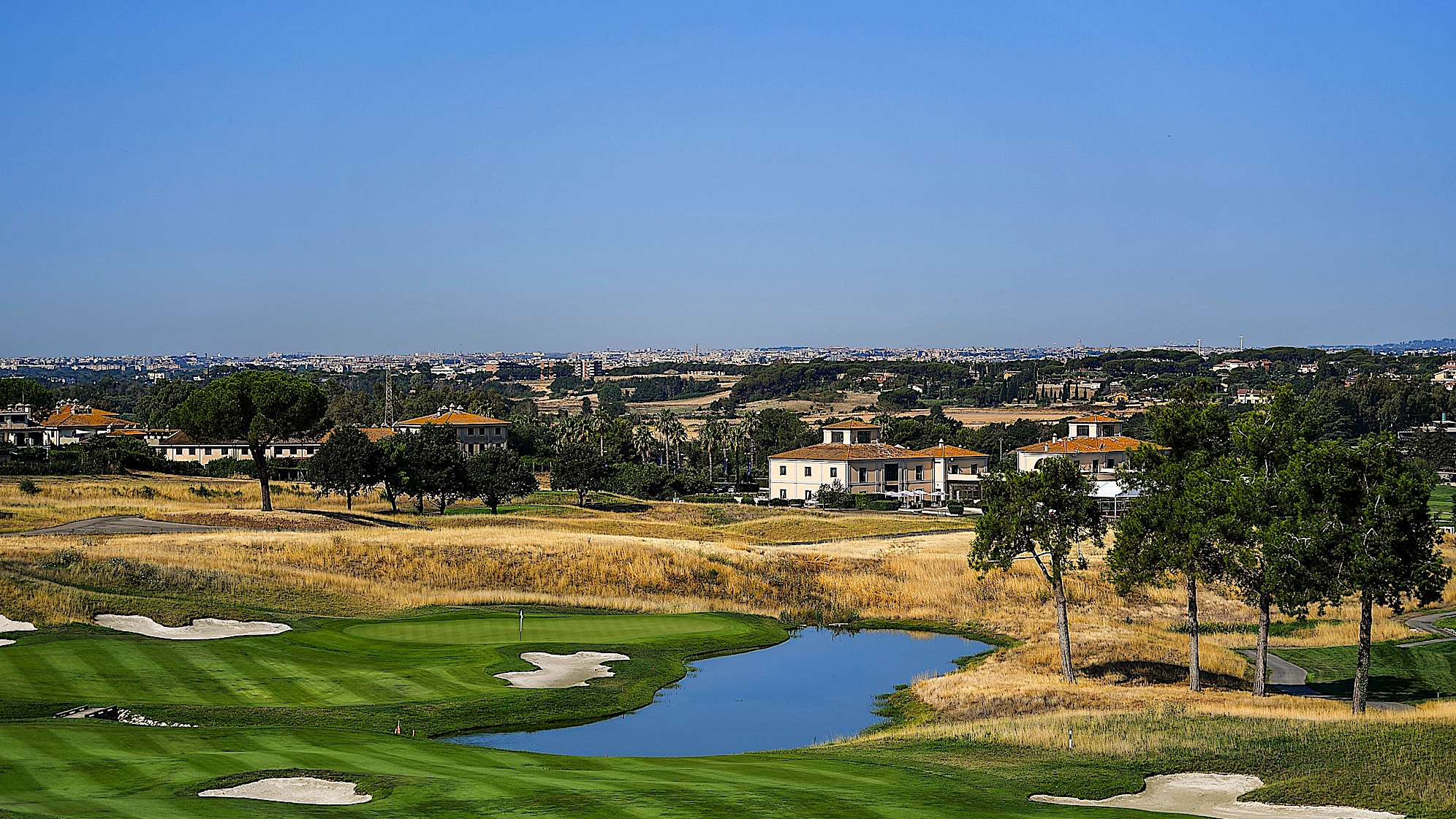Nine things to know: Marco Simone Golf & Country Club
9 Min Read
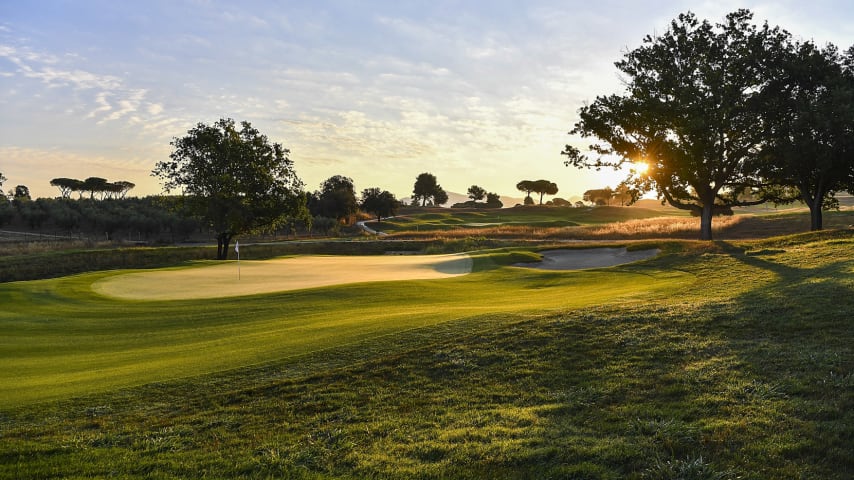
ROME, ITALY - AUGUST 02: A scenic view of the ninth hole prior to the 2023 Ryder Cup at Marco Simone Golf Club on August 02, 2022 in Rome, Italy. (Photo by Valerio Pennicino/Getty Images)
The captains’ picks have been made, the uniforms are ready, and travel schedules are set. The 44th Ryder Cup is upon us.
Here are nine things to know about Marco Simone Golf & Country Club, the venue for the first Ryder Cup ever held in Italy.
1. A TOUGH WALK SPOILED
Marco Simone presents big elevation changes. It’s 155 feet from the low point in the middle of the front nine to the high point on the back, requiring stamina from players and fans alike. That’s why Stewart Cink, a U.S. Vice Captain and veteran of five Ryder Cups as a player, called it “probably the most demanding physically of any (Ryder) Cup course I’ve ever seen.” The terrain will play a factor in lineup creation, as it will be less likely that players will compete in all five sessions of the three-day event.
“Guys are going to be happy to rest,” Cink said.
There are as many as nine semi-blind approach shots to elevated greens – a rarity, to say the least.
Marco Simone is just 24 miles east of the Mediterranean Sea and thus subject to the modest prevailing winds. The area enjoys a typically warm Mediterranean climate, but also has received above-average rainfall this year. The region around Rome typically gets 31 inches of precipitation annually, two-thirds of that through August. It has already seen 44 inches of rain this year, though very little since early August. This suggests a golf course that is drying out and will play reasonably fast – unless the rain returns for Ryder Cup week.
2. A NEW LOOK
Marco Simone dates to a late 1980s design by Italian architect David Mezzacane, who worked in conjunction with American architect Jim Fazio – nephew of the renowned American pro and architect George Fazio. Much of the on-site shaping work for that original project was undertaken by Jim’s son, Tom Fazio II, who was then in his early 20s.
Tom Fazio II has gone on to a distinguished career as a designer/builder and was brought back to the site in 2018-2020. He was the owner’s representative for construction management when the course was completely re-routed, and rebuilt all 18 holes under the direction of a team from European Golf Design led by Dave Sampson. (EGD is half-owned by the DP World Tour and serves as that body’s golf architecture arm.)
The Italian Golf Federation paid for the renovation as part of its winning Ryder Cup bid and work was completed in time for the DP World Tour’s Italian Open two years ago. The course is defined by two returning nines, with the front side on lower-lying and slightly more open ground, and the back featuring more elevation changes. The par 71 has a scorecard yardage of 7,181 yards.
3. REMINDERS OF ROME
One of just 325 courses in Italy, Marco Simone sits on a 350-acre estate in Guidonia, 10 miles northeast of central Rome. St. Peters Basilica is visible from the course on a clear day. The area, once farmland, has undergone steady residential and commercial development – a trend that accelerated after the Ryder Cup announcement eight years ago. The club’s name derives from an eponymous 11th-century castle, formerly a Roman fortification, on-site. Italian fashion designer Laura Biagiotti and her husband, Gianni Cigna, purchased the property in the 1970s and turned it into a country club adjoining the renovated castle in which they lived.
Continental Europe gets the biennial matches for only the third time since the Ryder Cup began in 1927. Back then the U.S. took on Great Britain & Ireland, but in 1979 the team was expanded to include all of Europe, and in 1997 the matches came to the Continent for the first time – at Valderrama, Spain. France hosted in 2018 at Le Golf National. Now it’s Italy’s turn. Europe has won both Ryder Cups in continental Europe, as the last U.S. road victory came in 1993.
4. BIG BUILD-OUT
The hilly terrain will provide plenty of amphitheater viewing for the throngs of passionate (and partisan) fans. Grandstands will handle the rest.
When EGD repurposed the site, it focused on both the course and the infrastructure. The latter task was akin to creating a football stadium big enough to accommodate 250,000 spectators for the week and as many as 45,000 a day – including media, team officials, security, hospitality, and vendor staff. Busses will deliver spectators to a bridge overpass leading to the main entrance and a huge merchandise tent. With the compact site and hilly terrain, the biggest set of grandstands will overlook the first tee, as was the case at Le Golf National and Whistling Straits in 2018 and ’21, respectively. Spectator seating will be more limited on the closing holes since half the matches never reach the 17th hole in the last three Ryder Cups.
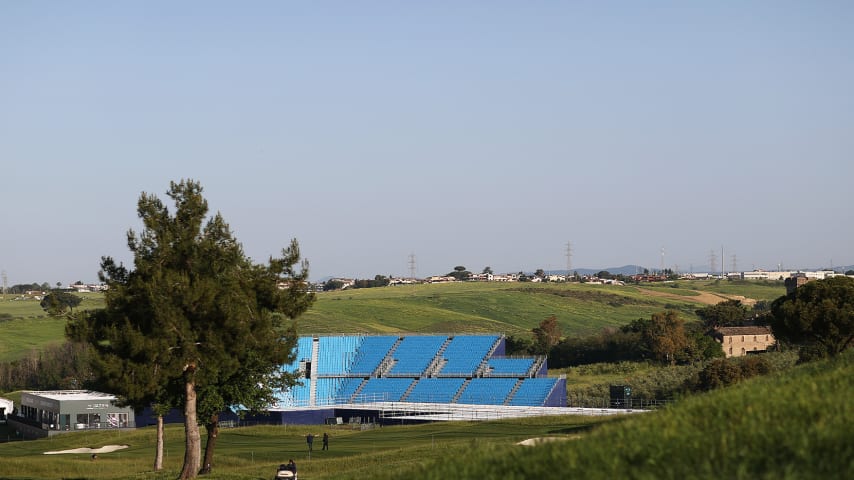
A general view of the grandstand around the 1st tee in preparation for the 2023 Ryder Cup at Marco Simone. (Naomi Baker/Getty Images)
5. A SUPER SUPER
The golf superintendent at Marco Simone is a woman – hardly unheard of, but still a rarity. Lara Arias, 33, speaks four languages, which she will need to communicate with her multinational, full-time staff of 20 and the additional 100 or so superintendents who will converge from around the world to help during Ryder Cup week. The native Spaniard holds a B.S in Forest Engineering and an M.A. in Golf and Sports Fields. Her C.V. includes stints on courses in the south of Spain and then an 18-month work-study program through Ohio State University that included assignments at RTJ Golf Club, TPC Scottsdale, Congressional and Quail Hollow Club.
At Marco Simone, she’s managed the grow-in and maintenance of turf types with very different weather preferences: warm-season Paspalum fairways along with cool-season bentgrass greens and fescue roughs. She was a lead staffer at Le Golf National for the 2018 Ryder Cup, directly reporting to greenskeeper Alejandro Reyes. They’re also a couple, and they’ll flip roles at Marco Simone, with Arias in charge and Reyes reporting to her. They share an Australian shepherd named Ryder, who is likely to get lots of airtime, and the good news is that Arias will be working this year’s Ryder Cup while pregnant, with a due date late in the year.
6. ROUGH STUFF
In their scouting trips to Marco Simone, players on both sides were struck by the thickness of the rough, the main defense for what is not an especially long course. So, just as it was five years ago at Le Golf National, it will be vitally important to find the fairway; Marco Simone has 31.5 acres of fairway – much less than Los Angeles Country Club’s North Course, which hosted the U.S. Open (50 acres) but a lot more than Royal Liverpool for The Open Championship (22 acres).
Fairway widths vary considerably at the landing areas, from 18 to 26 yards across. Along the way, players negotiate a total of 76 bunkers, split just about evenly between fairway and greenside hazards. The greens are on the slightly large size, averaging 6,770 square feet, with a lot of undulation.
7. MADE FOR MATCH PLAY
Marco Simone could see big momentum swings with three drivable par 4s and an equal number of par 5s that the players can reach in two. Given that four of those six potential eagle opportunities show up in the last eight holes, front-nine leads will not be safe.
“For match play, I think it's going to be super exciting because there's a good mix of the holes that are easy that you can make birdies and you can make eagles, but there's also some extremely difficult hose where if you make a par, you could win the hole,” said FedExCup champion Viktor Hovland.
The 16th hole is 303 yards and the last of three drivable par 4s. It also has the most potential trouble: a central fairway bunker, a canal across the fairway at 250 yards, and a diagonally canted green protected at the entrance by two flanking bunkers and by a pond down the entire right side. The hole plays 66 feet downhill, making the green well within reach off the tee for all 24 players. In the Friday and Saturday afternoon four-ball (best-ball) matches at least one player from each side will most likely take dead aim at the green from the tee – in many cases, with less than driver. Foursomes (alternate shot) matches might see more conservative play. The hole is likely to produce an eagle or two that could be a game-changer.
For matches that go the distance, the 597-yard, par-5 18th hole will play into the prevailing breeze but will be reachable in two because it plays 105 feet downhill. Bunkers squeeze the primary landing area and the second-shot lay-up zone, but the key element here is a green perched alongside a pond on the inside left that gobbles up anything hit strong or pulled slightly.
8. LOCAL KNOWLEDGE
Team Europe’s 12 players have racked up a total of 11 starts at the DP World Tour’s Italian Open at Marco Simone over the last three years, including a win by Robert MacIntyre of Scotland in 2022. No one from the U.S. side has competed there, though the United States did take a recent scouting trip to the course. At least everyone will get three full days of practice before the competition starts Friday; they’ll be taking careful notes, especially because so many of the tee shots call for strategic choices of a risk/reward nature. Moreover, the marked contours of the greens will make specific demands on how to position approach shots.
Marco Simone is a parkland layout framed by commercial and residential development. Europe Captain Luke Donald dictated the set-up, including fairway widths, mowing heights and bunker placement, but that influence ends once Ryder Cup week begins. That’s when responsibility for course setup turns over to a joint committee of the two teams. Players will be notified Monday morning about the teeing grounds and hole locations that will be used for each of the five sessions, but they won’t know in which order and which day those tees or hole locations will be used. That and basic day-to-day variables will be up to the joint committee.
9. A FANTASTIC FINISH
There are four eagle opportunities over the last eight holes, offering the prospect of an emotional roller coaster. No lead will be safe.
Given its rhythm of holes and the dynamic of risk that mounts as the routing unfolds, this hilly, little-known course could be a surprise player and make for compelling viewing. It will not simply be a backdrop for the drama, but an active participant. One of the most intriguing aspects of the Ryder Cup is roster selection for foursomes and deciding which hole players will tee off on, as one players tees off on the odd-numbered holes and one tees off on the evens.
| Marco Simone Golf & Country Club | ||
| Hole | Par | Yards |
| 1 | 4 | 445 |
| 2 | 4 | 506 |
| 3 | 4 | 453 |
| 4 | 3 | 188 |
| 5 | 4 | 302 |
| 6 | 4 | 381 |
| 7 | 3 | 222 |
| 8 | 4 | 525 |
| 9 | 5 | 587 |
| Out | 35 | 3609 |
| Hole | Par | Yards |
| 10 | 4 | 453 |
| 11 | 4 | 329 |
| 12 | 5 | 546 |
| 13 | 3 | 150 |
| 14 | 4 | 509 |
| 15 | 4 | 479 |
| 16 | 4 | 303 |
| 17 | 3 | 206 |
| 18 | 5 | 597 |
| In | 36 | 3572 |
| 71 | 7181 | |
Bradley S. Klein is a veteran golf writer and author of 10 books on course design. A former PGA TOUR caddie, he was architecture editor of Golfweek for over two decades and is now a freelance journalist and course design consultant. Seguir Bradley S. Klein em Twitter.

